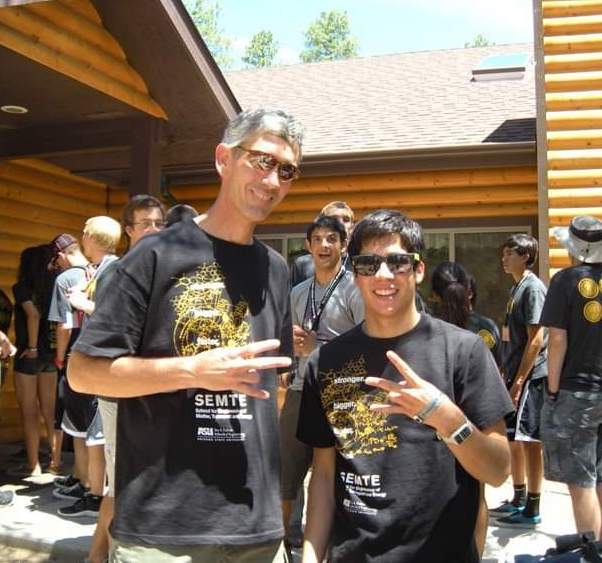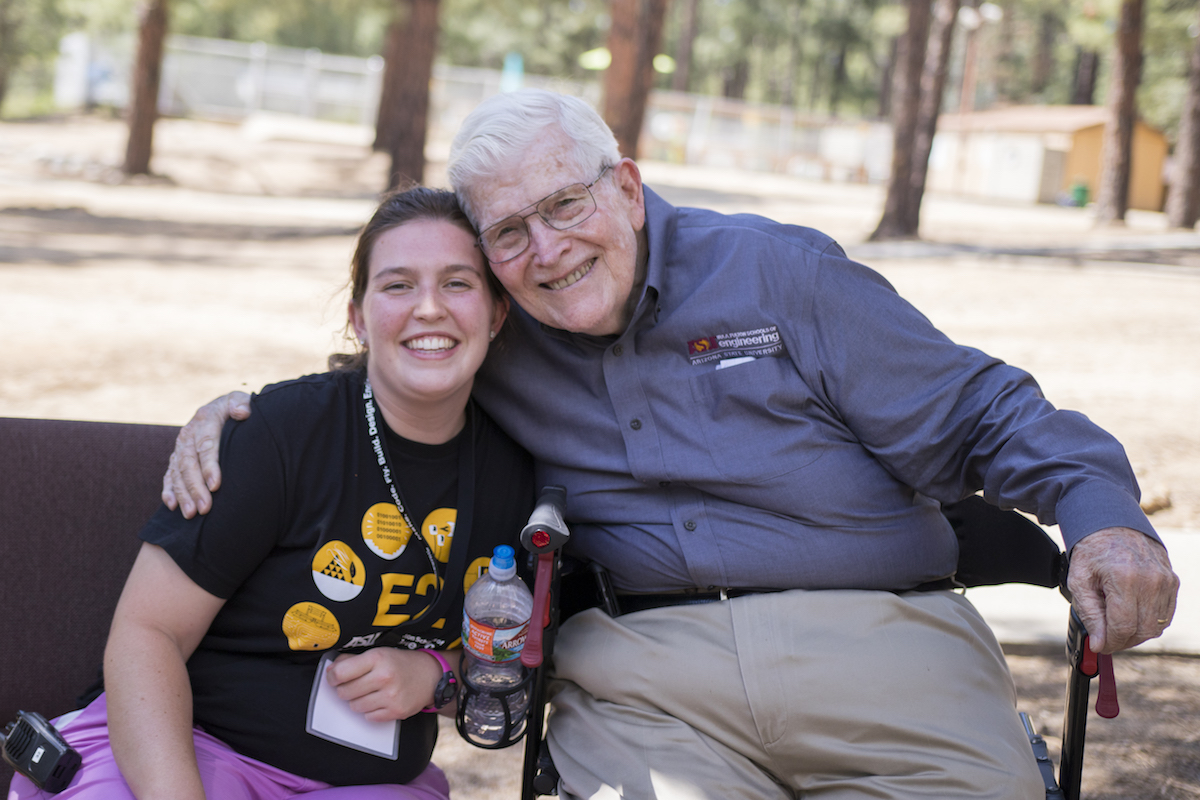Igniting connections at E2

Fulton Schools alumna Joy Marsalla (highlighted) was one of 75 volunteers from industry to participate in the virtual E2 experience during summer 2020. More than 3,500 first-year students from around the world joined E2. Screenshot captured by Jessica Hochreiter/ASU
During an age when technologies can yield fewer personal interactions — compounded with current social distancing protocols keeping many of us separated — maintaining meaningful connections is more important than ever.
Some of the earliest connections made by first-year students in the Ira A. Fulton Schools of Engineering at Arizona State University happen during E2.
E2 is a unique experience for incoming engineering students to come together with faculty, staff, alumni and industry professionals to get to know the Fulton Schools and build relationships in a casual setting.
Traditionally held away from campus among the towering pines of Prescott, Arizona, the 2020 E2 experience was unlike all its predecessors. The COVID-19 pandemic transformed the highly anticipated gathering into a virtual experience — and created new opportunities that have redefined E2.
More than 3,500 incoming students from around the world used Zoom this summer to join one of 20 virtual sessions for their introduction to life as an engineering student in the Fulton Schools.
“E2 emphasizes how much the Fulton Schools cares about students, and how much Ira A. Fulton, our namesake and biggest cheerleader, is still supporting us and wants every one of us to succeed and complete our degree and have a great time doing it,” said Emily Nugent, a 2020 E2 volunteer and recent graduate of the Fulton Schools. “They want us to be involved inside and outside of the classroom. That’s what made my experience exceptional, and I want future students to have those same opportunities.”
But what distinguishes E2 from so many other introductory programs are the real opportunities to connect with working engineers, technologists and alumni who are committed to sharing advice, detailing their own experiences and helping students navigate through their academic and career journeys.
Engineering connections

Former Fulton Schools Dean Paul Johnson and Nicolas Corrales before an ASU 101 session at E2 in 2012. Photo courtesy of Nicolas Corrales.
For Nicolas Corrales, the connections he made as a first-year student at E2 in 2010 had a significant impact on his time at ASU, compelling the two-time Fulton Schools graduate to participate as an E2 volunteer every subsequent year, starting his sophomore year.
“I still look back to this day at the connections I made and every experience I gained,” said Corrales, who is a climate control computational fluid dynamics engineer for Ford Motor Company in Michigan. “Being on the other side of the country is another motivation. I don’t get to Tempe very often, so returning for E2 camp also helps me stay connected with the school.”
Corrales says the other students he met during his first camp as an incoming freshman became close friends throughout his years at ASU, and that without E2 he would not have been as involved beyond his coursework during his time as a student.
“I continue to talk with many people I met during the camp to this day,” Corrales said. “I feel the most important part of this camp is building those lasting connections because they prepare students to work together and to develop the mindset that connections will be important to your success.”
The connections made at E2 are not limited to those between students. There also are opportunities for students to connect with industry professionals who can be influential in their academic journey.
Joy Marsalla, a two-time Fulton Schools graduate, is now a member of the alumni board, where she serves alongside Fulton Schools alumnus Chris Kmetty, a construction engineering manager at Markham Contracting Co. Inc.
“I met Chris, one of my long-term mentors, at E2 camp,” said Marsalla, who earned a master’s degree in civil and environmental engineering in 2012. “Chris helped me kickoff Order of the Engineer at ASU, he helped me find my first internship and he is a friend and advocate today.”
Realizing the importance of mentorship and advocacy for students, Marsalla, who now works as a sustainable chemicals management and air emissions program manager at Nike, volunteered throughout several of this year’s virtual E2 sessions.
“Living in Portland, Oregon, I was able to volunteer after work and do a lot more than I would have had E2 been held in person,” she said.
“While I am sad that the in-person experience was missed, I am so inspired by the experienced students, faculty, volunteers and new students who came together to make the best of the experience,” Marsalla said. “I’m most proud of the conversations E2 sparked. E2 connected and reconnected us, so that we can make a bigger impact throughout the year.”
Nugent became a two-time alumna last spring when she graduated with a master’s degree in materials science and engineering. Having spent her final semester as a student just as the pandemic was emerging in the U.S., she was able to draw from her own personal accounts to connect with the incoming students and reassure them about how ASU is handling COVID-19 and online courses.
“I loved being able to use my experience to help new students,” said Nugent, a yield enhancement engineer at NXP Semiconductors. “It felt good to be able to address some of the things making them nervous.”
Emily Nugent (left) is shown here with Ira A. Fulton in 2018 when she volunteered as an E2 student lead. During the fireside chat sessions she led at this year’s E2, Nugent was able to reconnect with fellow alumni and old friends who had also served student volunteers. Photo by Marco-Alexis Chaira/ASU
Strengthening connections
Volunteering at E2 enables alumni to stay connected with the Fulton Schools and feel a stronger connection to the school and their peers. When it was clear the COVID-19 pandemic would prevent the typical E2 experience, the Fulton Schools alumni chapter hosted a virtual mixer to give former engineering students the opportunity work with Fulton Schools staff to share ideas and explore new ways to engage incoming students.
“The opportunity to reconnect with the staff and faculty through E2 camp is always something I look forward to,” Corrales said. “It’s great to hear how the school continues to grow. Also, having the opportunity to meet fellow alumni from different years has been great.”
The new virtual format brought in more than 75 alumni and industry volunteers. Throughout the planning stages and the E2 sessions, many alumni volunteers said watching new engineering and technology students start their journey was especially inspiring.
“I’m proud that I could jump into some of the meetings and see such a qualified and eager group of people ready to start their engineering careers,” Marsalla said. “The format of the meetings allowed us to act as mentors as well as to reconnect with other alumni. I’m proud of how many showed up and dedicated their time and energy to supporting E2.”
Among the many volunteers were also returning students, who recognized the value of building a sense of community and belonging based on their own participation as incoming students.
“When I was a student, it was a good to see students ahead of me in school be leaders,” Nugent said. “It was encouraging to see those students again when I got involved on campus and see some familiar faces.”
Embracing connections
Students often make connections at E2 that create friendships. These connections carry over into their classes as study groups, into their dorms and into their professional careers as colleagues, mentors and advocates.
“I was able to meet my roommate for the first time at E2,” Nugent said. “We are still best friends and have even visited each other in different states since graduating. I know tons of people who have met their best friend at E2 and, in a few cases, even their future spouse.”
The meaning of making connections is more than helping us to feel a part of something bigger than ourselves. It can lead to better mental health and show the value of having a dedicated support network.
“E2 is a unique experience that shows how ASU truly prioritizes the relationships students build among themselves, faculty and the community of supporters, alumni and other advocates,” Marsalla said.
“I really felt welcome and that engineering was a giant family,” Nugent said. “I still feel this way. E2 truly represented my experience as an engineering student at ASU. It was a great way to learn about resources and what I should expect from my freshman year and beyond.”
More Science and technology

ASU to help Arizona Army installation improve energy, lower costs
In a move that will support resilient energy systems in the places that keep our nation safe, Arizona State University signed a…

ASU brings 'Science @ Scale' to AAAS meeting in Phoenix
When the American Association for the Advancement of Science Annual Meeting takes place this month in Phoenix, Arizona State…

The AI tool giving teachers time back
Sarvesh Bhardwaj didn’t set out to disrupt American education. At first, he was just a parent watching his son struggle.Even in a…
